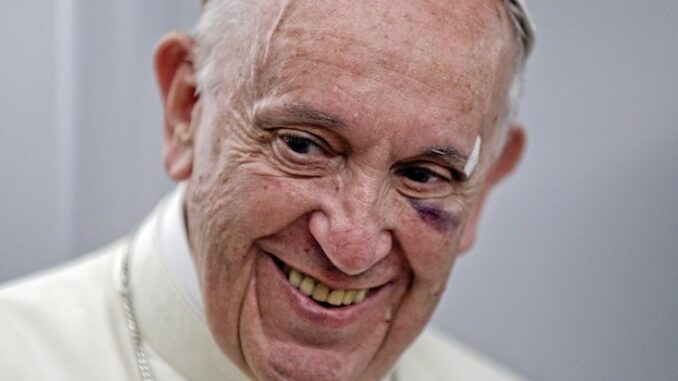
In his apostolic letter titled Traditionis Custodes (“Guardians of Tradition”), the pope has banned the celebration of the traditional Latin Mass – known as “Tridentine” Mass – in Catholic parishes and lifted existing accommodations to priests who wish to perform it.

BYPASS THE CENSORS
Sign up to get unfiltered news delivered straight to your inbox.
You can unsubscribe any time. By subscribing you agree to our Terms of Use
Latest Video
Breitbart.com reports: Local bishops may designate one or more locations where the faithful adherents of traditional groups may gather for the eucharistic celebration, he declares, but “not however in the parochial churches.”
While providing for the spiritual needs of groups “that celebrate according to the Missal antecedent to the reform of 1970,” the pope writes, bishops are to establish a series of new strictures and to refrain from authorizing “the establishment of new groups.”
The present letter reverses measures to relax restrictions on the use of the traditional form by Pope Benedict XVI, who, in 2007, noted that many of the faithful have continued to be attached with “love and affection to the earlier liturgical forms which had deeply shaped their culture and spirit.”
In recognition of this diversity, Pope John Paul II sought greater inclusiveness by granting the faculty of using the older form and “exhorted bishops to make broad and generous use of this faculty on behalf of all the faithful who sought it,” Benedict wrote.
Benedict went on to establish that the Roman Missal promulgated by Pope Paul VI “is the ordinary expression of the lex orandi (rule of prayer) of the Catholic Church of the Latin rite” whereas the Roman Missal promulgated by Saint Pius V “is nonetheless to be considered an extraordinary expression of the same lex orandi of the Church and duly honoured for its venerable and ancient usage.”
For his part, Pope Francis has now asserted that the 1970 Roman Missal is not the “ordinary expression” but rather “the unique expression of the lex orandi of the Roman Rite” (emphasis added). The new, exclusive ruling seems to eliminate the older form of the Mass as a legitimate expression of the lex orandi of the Church, despite its venerable tradition.
Pope Benedict had granted broad faculties to Catholic priests who wished to say Masses in private using the Roman Missal published in 1962, declaring that to do so “the priest needs no permission from the Apostolic See or from his own Ordinary.”
According to Francis’ new restrictions, priests who wish to celebrate using the Roman Missal of 1962 “should submit a formal request to the diocesan Bishop who shall consult the Apostolic See before granting this authorization.”
“Previous norms, instructions, permissions, and customs that do not conform to the provisions of the present Motu Proprio are abrogated,” Francis decrees.
The Vatican’s own website asserts that “according to present norms, the Latin language still holds primacy of place as that language which, based on principle, the Church prefers, even though she recognizes that the vernacular can be useful for the faithful.”
The Vatican goes on to note that “Latin should be safeguarded as a precious inheritance of the Western liturgical tradition.”
The Code of Canon Law, which governs Church activity and liturgy, similarly stipulates: “The eucharistic celebration is to be carried out in the Latin language or in another language provided that the liturgical texts have been legitimately approved.”
Saint John Paul II urged the continued use of Latin in the Church to maintain ties with its own history and traditions.
“The Roman Church has special obligations towards Latin, the splendid language of ancient Rome,” he wrote, adding that “she must manifest them whenever the occasion presents itself.”
Pope Francis justifies the reversal of the more inclusive approach of his predecessors by insisting that their pastoral kindness “was exploited to widen the gaps, reinforce the divergences, and encourage disagreements that injure the Church, block her path, and expose her to the peril of division.”


